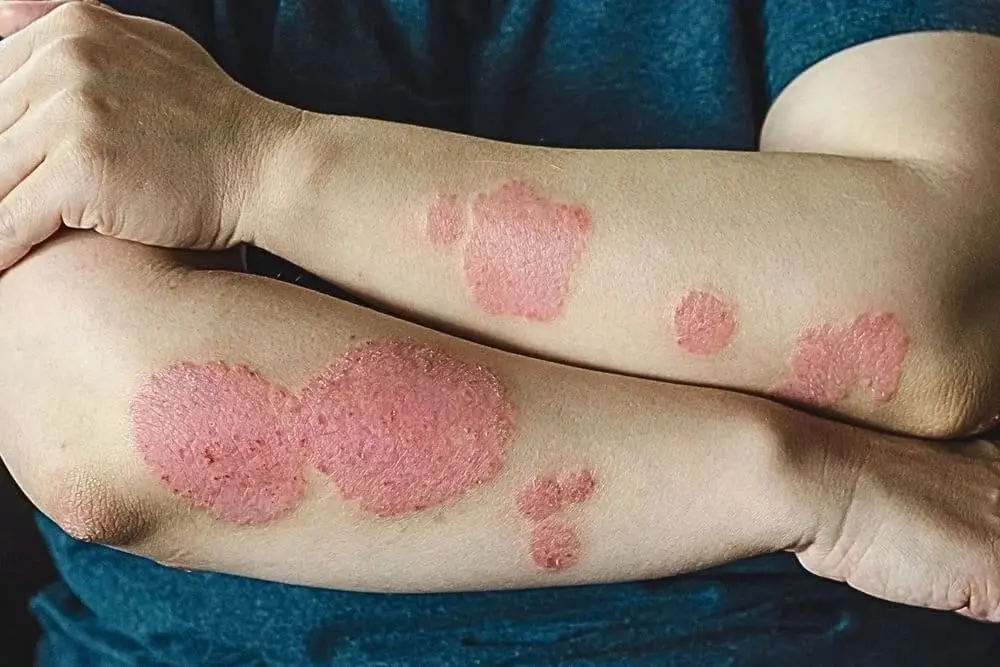Newsletter
Sign up for our newsletter to get updated information.

Understanding Psoriasis Through Ayurveda: A Holistic Approach to Healing
Psoriasis is a chronic autoimmune condition characterized by the rapid growth of skin cells, leading to thick, scaly patches on the skin. While conventional treatments often focus on managing symptoms, Ayurveda offers a holistic approach that targets the root causes of psoriasis. By balancing the body’s energies, or doshas, and promoting overall wellness, Ayurveda can provide effective strategies for managing this condition.
What is Psoriasis?
Psoriasis is not just a skin condition; it is a systemic disease that can affect various aspects of health, including joints (psoriatic arthritis). The most common form is plaque psoriasis, marked by raised, red patches covered with silvery-white scales. FStress, infections, skin injuries, and certain lifestyle factors can trigger flare-ups
Psoriasis in Ayurvedic Terms
In Ayurveda, psoriasis is often associated with an imbalance in the Pitta dosha, which governs heat and inflammation. The condition can also involve a disturbance in the Kapha dosha, leading to the accumulation of toxins (ama) in the body. Understanding these imbalances is key to developing a holistic treatment plan.
Key Ayurvedic Principles for Managing Psoriasis
⦁ Dietary Adjustments:
⦁ Cooling Foods: Emphasize foods that cool the body and reduce inflammation. Incorporate cucumbers, melons, leafy greens, and sweet fruits.
⦁ Anti-Inflammatory Spices: Use turmeric, cumin, and coriander to enhance meals. These spices have anti-inflammatory properties that can help soothe skin irritation.
⦁ Whole Grains and Legumes: Choose easily digestible grains like quinoa, barley, and lentils to provide balanced nutrition without aggravating Pitta.
⦁ Hydration:
⦁ Staying well-hydrated is essential. Drink plenty of water and herbal teas, such as chamomile or peppermint, which can have calming effects on the body.
⦁ Detoxification:
⦁ Regular detoxification is vital for managing psoriasis. Ayurvedic practices like Panchakarma, which includes therapies to cleanse the body of toxins, can be beneficial. Always consult a qualified practitioner for guidance.
⦁ Herbal Remedies:
⦁ Neem: Known for its blood-purifying properties, neem can help reduce inflammation and combat infections.
⦁ Turmeric: This powerful herb supports liver health and reduces inflammation.
⦁ Triphala: A blend of three fruits, Triphala aids digestion and detoxification, promoting overall health.
⦁ Lifestyle Modifications:
⦁ Stress Management: Practices such as yoga, meditation, and deep breathing exercises can help reduce stress, a common trigger for psoriasis flare-ups.
⦁ Regular Sleep: Aim for a restful sleep to support overall healing and immune function.
⦁ Topical Treatments:
⦁ Herbal Pastes: Pastes made from neem, turmeric, or aloe vera can be applied to affected areas to soothe irritation and promote healing.
⦁ Oil Massage: Using warm oils such as sesame or coconut oil for massage can help hydrate the skin and improve circulation.
⦁ Mind-Body Connection:
⦁ Ayurveda emphasizes the importance of the mind-body connection. Addressing emotional and psychological factors can be crucial in managing psoriasis. Consider journaling, therapy, or support groups to explore these aspects.
Sample Ayurvedic Lifestyle Plan for Psoriasis
Morning Routine:
⦁ Start with warm lemon water to detoxify.
⦁ Engage in gentle yoga or stretching exercises.
⦁ Breakfast: Quinoa porridge with fruits and a sprinkle of cinnamon.
Midday:
⦁ Lunch: Steamed vegetables with brown rice and lentils, seasoned with turmeric and cumin.
⦁ Hydrate with herbal tea.
Afternoon:
⦁ Snack on fresh fruits or soaked almonds.
⦁ Practice mindfulness or meditation for stress relief.
Evening:
⦁ Dinner: Light vegetable soup or khichdi (a blend of rice and lentils) with cooling herbs.
⦁ Apply a herbal paste on affected areas before bed.
Weekly Practices:
⦁ Schedule regular detox sessions, such as Panchakarma or at-home detox methods.
⦁ Engage in activities that promote relaxation and joy.
Final Thoughts
Managing psoriasis through Ayurveda requires a commitment to a holistic lifestyle that nurtures the body, mind, and spirit. By focusing on dietary changes, herbal remedies, and lifestyle modifications, you can work towards restoring balance and alleviating symptoms.
As always, consulting with a qualified Ayurvedic practitioner or healthcare provider is important to tailor a plan that suits your needs. Embrace the holistic wisdom of Ayurveda, and embark on a journey toward healing and well-being.